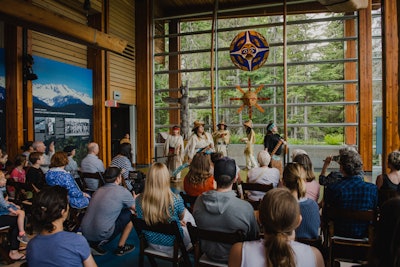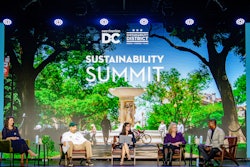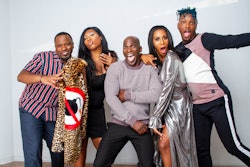
Earlier this year, the British Columbia Association of Aboriginal Friendship Centres (BCAAFC), an organization that supports urban Indigenous peoples, detailed the “racist and disturbing” treatment of one of its cultural advisors during a conference at the Hyatt Regency Vancouver.
The hotel’s general manager issued an apology to BCAAFC executive director Leslie Varley saying, "I sincerely apologize to the BCAAFC cultural advisor for the experience he had at our property. We have empathy for the pain this has caused him." The letter went on to detail how the hotel is committed to learning from the experience, and listed actionable steps it plans on taking, including retaining its own cultural advisor to train staff and working with Indigenous organizations to learn how they can hire, support, develop, and retain Indigenous employees.
BCAAFC was planning to host its Gathering Our Voices Indigenous youth event at the Hyatt Regency Vancouver in late March, but switched venues because of the incident. The First Nations Health Authority also announced that it plans to move its upcoming First Nations Health and Wellness Summit—which was slated to take place at the Hyatt April 4-6—to an alternate venue.
As seen with the gun laws in Georgia and the abortion bans in states across the U.S., political issues can impact events, with organizers deciding to cancel or move gatherings because of a location's legislature. In Canada, many folks, including those in the events industry, are fighting back against centuries of discriminatory practices toward Indigenous peoples in an effort to improve the cultural climate.
This includes offering Indigenous cultural awareness programs with Elder-directed content. In Canada, the word Indigenous is an umbrella term that includes First Nations, Inuit, and Métis. Paris Grover, Cree-Métis, senior corporate events coordinator for First Nations Financial Management Board, a nonprofit organization that helps First Nations implement governance and finance practices, said she'd like to see more hotels and venues implement Indigenous awareness training for all on-site staff, but noted that, often, Inuit and Métis are excluded from training and are lesser known. At the Squamish Lil’wat Cultural Centre, planners can add cultural enhancements to their events like performances, workshops, or an Indigenous-inspired feast.Photo: Courtesy of SLCC
At the Squamish Lil’wat Cultural Centre, planners can add cultural enhancements to their events like performances, workshops, or an Indigenous-inspired feast.Photo: Courtesy of SLCC
Dr. Laurie Harding, an adjunct professor at the University of Victoria in British Columbia and founder of Insight Indigenous Anti-Racism Coaching Services, offers workshops that aim to identify and intervene in Indigenous-specific racism, as well as improve relationships with Indigenous colleagues and provide safer services for Indigenous peoples.
Harding identifies as a white settler living on unceded Cowichan homelands. Because of this, she co-facilitates her coaching workshops with Indigenous peoples, or takes direction from Indigenous peoples. She explained that “much of what I say Indigenous peoples have already said, but we have been groomed and socialized to listen to white people.”
Referring to the Hyatt incident, she said that “how you treat people who come to events is indicative of who you value, what you value, and what you know.” She added that “if education is the only thing [the Hyatt] does, that's not good enough because we can't educate ourselves out of this. It's not one course, and you're done. It’s about looking at their policies and considering feedback loops.”
Doing more includes reaching out and building relationships with those whose land you're operating on, and “that's a part of reconciliation,” she said. “It's not about diversifying the system. It's about changing the system.”
Doug Young, digital media marketing specialist for Indigenous Corporate Training (ICT) in Saanichton, British Columbia, added that companies often seek training because of “the fear of saying or doing the wrong thing.” Through training, participants learn about current Indigenous issues and how to cultivate Indigenous relationships. ICT’s clients include the Four Seasons, Whistler Blackcomb, and the Canadian Museum of History.
“Event venues that have an Indigenous awareness training program for their staff are more likely to be successful in their bid to host an event where Indigenous participants will be attending. The organizers of the event will be more confident in the venue knowing that the needs and cultural differences of the Indigenous peoples attending will be better understood and accommodated by the venue,” Young said.
What event planners can and should do...
Although not as widespread in the U.S. as it is in Canada, Australia, and New Zealand, a native land acknowledgement by an event planner or venue demonstrates a commitment to allyship with Indigenous nations. It’s a verbal or written statement honoring the Indigenous occupants of the area where an event takes place.
The U.S. Department of Arts and Culture, an independent nongovernmental agency, offers a land acknowledgement guide for U.S. residents that provides context about the practice, gives step-by-step instructions on how to begin, and shares tips for taking action. It should be noted that event organizers should not refer to themselves or the hosting organization/company as a “guest” in the land acknowledgement statement. This implies that you were invited. If someone from an Indigenous nation asked or permitted you to host an event, then it’s OK to call yourself a guest.
Another resource: The Indigenous Tourism Association of British Columbia (ITBC) encourages event planners to consider how Indigenous culture, education, and businesses could be involved in corporate events, meetings, and retreats.
 Planners can work with SLCC staff to design menus with Indigenous-inspired foods.Photo: Courtesy of SLCC
Planners can work with SLCC staff to design menus with Indigenous-inspired foods.Photo: Courtesy of SLCC
Grover noted, though, that because there are only a handful of First Nations-owned event venues and conference centers in Canada, she often has to look at alternative options, which is why all venues should be striving to work with Indigenous businesses.
Georgina Dan, Líl̓wat7úl, cultural administrator for the Squamish Lil’wat Cultural Centre (SLCC) in Whistler, said that planners can work with the venue's staff to design menus with Indigenous-inspired foods with stories about the history of the dishes. Events can also include Indigenous-designed or -themed decor.
In Canada, there are more than 600 Indigenous communities, and 200 of them are in British Columbia, Dan said, each with their own protocols and practices. “It is OK to ask if things need to be done a certain way or if there is a respectful way of honoring the work that is being done,” she said. “We are here to educate and to be here for anyone asking these questions at any stage of their journey.”



















